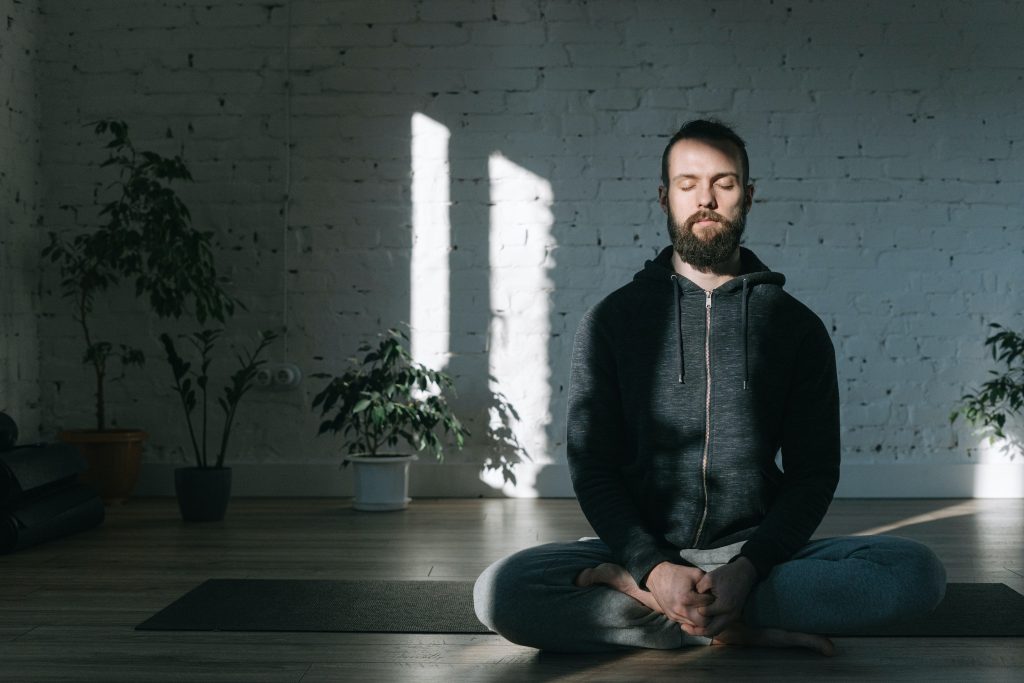Learn how practicing mindfulness can help alleviate anxiety and improve overall mental well-being.
Discovering the Benefits of Mindfulness for Anxiety
Do you ever find your mind racing at a million miles per hour? Does worry and fear consume your every thought? If so, you’re not alone. Anxiety affects millions of people worldwide, but the good news is that there is a powerful tool that can help: mindfulness. In this article, we will explore the incredible benefits of mindfulness for anxiety and how it can transform your life.
Understanding Anxiety: A Brief Overview

Anxiety is a complex emotion that can manifest in various ways. It’s not just about feeling nervous or worried, but it can also include physical symptoms such as rapid heartbeat, shortness of breath, and sweaty palms. Understanding the nature of anxiety is the first step towards finding relief.
Anxiety is a natural response to stress and can be beneficial in certain situations. It can help us stay alert and focused, preparing our bodies to react to potential threats. However, when anxiety becomes excessive or persistent, it can interfere with our daily lives and overall well-being.
Common triggers for anxiety include stressful life events, such as moving house or starting a new job, as well as internal factors like negative thinking patterns and low self-esteem. It’s important to note that everyone experiences anxiety differently, and what may trigger anxiety in one person may not affect another in the same way.
When faced with a triggering situation, the body’s natural response is to release stress hormones, such as adrenaline and cortisol, which prepare us for the “fight or flight” response. This response can be helpful in dangerous situations, but when it occurs in non-threatening situations, it can lead to excessive anxiety.
Understanding the underlying causes of anxiety can be a complex process. It often involves exploring past experiences, identifying patterns of thinking, and examining how our environment and relationships contribute to our anxiety levels. Therapy and counseling can be valuable tools in this journey of self-discovery and healing.
It’s important to remember that anxiety is a common mental health condition that affects millions of people worldwide. You are not alone in your struggles, and there is support available to help you manage and overcome anxiety. Seeking professional help and building a strong support network can make a significant difference in your journey towards mental well-being.
By recognizing these triggers, you can begin to regain control over your anxiety. It’s important to develop healthy coping mechanisms and self-care practices that work for you. This may include engaging in regular exercise, practicing relaxation techniques such as deep breathing or meditation, and seeking social support from friends and loved ones.
Remember, managing anxiety is an ongoing process. It’s not something that can be solved overnight, but with time, patience, and the right support, you can learn to navigate your anxiety and live a fulfilling life.
The Concept of Mindfulness
Mindfulness is a practice that has been around for centuries, rooted in ancient Eastern philosophies. It involves paying attention to the present moment, without judgment or attachment. In essence, mindfulness is about cultivating a state of awareness and acceptance of whatever arises.
In modern psychology, mindfulness has gained significant recognition for its ability to alleviate stress, improve mental health, and increase overall well-being. By incorporating mindfulness into your daily life, you can experience profound transformations in your relationship with anxiety.
When we talk about mindfulness, it is important to understand that it is not just a passing trend or a quick fix. It is a way of life, a practice that requires dedication and commitment. Mindfulness is not about escaping from reality or suppressing our emotions; instead, it invites us to fully engage with our experiences, both pleasant and unpleasant.
One of the key aspects of mindfulness is the idea of non-judgment. Often, we tend to label our thoughts, feelings, and sensations as either good or bad, desirable or undesirable. This labeling creates a sense of attachment or aversion, leading to further suffering. Mindfulness encourages us to observe our experiences without judgment, allowing them to come and go without getting caught up in them.
Through the practice of mindfulness, we can develop a greater sense of self-awareness. By paying attention to our thoughts, emotions, and bodily sensations, we become more attuned to the present moment. This heightened awareness enables us to respond to situations with clarity and wisdom, rather than reacting impulsively based on our conditioned patterns of behavior.
Moreover, mindfulness can be a powerful tool in managing stress and anxiety. When we are mindful, we are able to recognize the signs of stress and anxiety as they arise, giving us the opportunity to respond in a skillful way. By cultivating a non-reactive attitude towards our inner experiences, we can break free from the cycle of rumination and worry that often accompanies anxiety.
Research has shown that regular mindfulness practice can have a multitude of benefits for mental health. It has been found to reduce symptoms of depression, improve attention and focus, enhance emotional regulation, and increase overall well-being. By training our minds to be more present and aware, we can create a solid foundation for mental and emotional resilience.
Incorporating mindfulness into your daily life does not have to be complicated. It can be as simple as taking a few moments each day to pause and bring your attention to your breath, or engaging in activities mindfully, such as eating or walking. The key is to approach these moments with a sense of curiosity and openness, allowing yourself to fully experience the present moment.
So, whether you are new to mindfulness or have been practicing for years, the concept of mindfulness offers a profound and transformative way of relating to yourself and the world around you. By embracing mindfulness, you can cultivate a deeper sense of peace, clarity, and well-being in your life.
The Connection Between Mindfulness and Anxiety
Understanding the intricate relationship between mindfulness and anxiety can shed light on the transformative power of this practice. Mindfulness, a state of present moment awareness, has been extensively studied and proven to have a profound impact on anxiety.
Research has shown that mindfulness works its magic on anxiety by directly influencing the brain. Through the practice of mindfulness, neural pathways are rewired, leading to a reduction in the activity of the amygdala. The amygdala, often referred to as the “fear center” of the brain, is responsible for triggering fear and stress responses. By calming the amygdala, mindfulness helps to alleviate anxiety and promote a sense of tranquility.
However, the benefits of mindfulness extend beyond its effects on the brain. Emotional regulation, a crucial aspect of managing anxiety, is greatly enhanced through the practice of mindfulness. When faced with anxious thoughts and feelings, mindfulness allows individuals to observe them without becoming entangled or overwhelmed. This shift in perspective can be immensely liberating, breaking the cycle of anxiety and opening the door to a newfound sense of calm and clarity.
Moreover, mindfulness empowers individuals to cultivate a deeper understanding of their anxiety. By paying attention to the present moment, without judgment or resistance, individuals can explore the root causes of their anxiety and gain insight into their triggers. This self-awareness provides a solid foundation for developing effective coping strategies and making positive changes in one’s life.
Furthermore, mindfulness fosters a sense of acceptance and compassion towards oneself. Often, anxiety is accompanied by self-critical thoughts and a constant striving for perfection. Mindfulness encourages individuals to approach their anxiety with kindness and understanding, embracing their experiences without judgment. This self-compassion can be incredibly healing, allowing individuals to let go of the harsh self-judgment that often exacerbates anxiety.
It is important to note that mindfulness is not a quick fix for anxiety. Like any skill, it requires consistent practice and patience. However, the rewards of incorporating mindfulness into one’s life are immeasurable. By cultivating a mindful approach to anxiety, individuals can experience a profound shift in their relationship with their thoughts and emotions, leading to a greater sense of peace and well-being.
Techniques for Practicing Mindfulness
Now that you understand the benefits of mindfulness for anxiety, let’s explore some practical techniques you can incorporate into your daily routine. One of the simplest and most accessible practices is mindful breathing. Taking a few moments each day to focus on your breath can ground you in the present moment and bring a sense of calm.
Mindful breathing involves paying attention to the sensation of your breath as it enters and leaves your body. You can do this practice anywhere, whether you’re sitting at your desk, standing in line, or lying in bed. Close your eyes if it feels comfortable, and take a deep breath in through your nose, feeling the air fill your lungs. Then, slowly exhale through your mouth, letting go of any tension or stress. As you continue to breathe, notice the rise and fall of your abdomen or the feeling of air passing through your nostrils. If your mind starts to wander, gently bring your attention back to your breath, without judgment.
Another powerful practice is the body scan meditation, where you systematically scan your body from head to toe, paying attention to any sensations or areas of tension. This practice not only helps you become more aware of your body but also promotes relaxation and reduces anxiety.
To begin a body scan meditation, find a comfortable position either sitting or lying down. Close your eyes and bring your attention to your breath, taking a few deep breaths to relax your body. Start by focusing on your head, noticing any sensations such as tension, warmth, or tingling. Slowly move your attention down to your neck, shoulders, and arms, observing any tightness or discomfort. Continue to scan your body, exploring each area with curiosity and non-judgment. If you come across any areas of tension, imagine sending your breath to that area, allowing it to relax and release. Take your time as you move down to your chest, abdomen, hips, legs, and feet. Finally, take a moment to scan your entire body as a whole, noticing any changes or sensations that may have arisen during the practice.
By regularly practicing mindful breathing and body scan meditation, you can cultivate a greater sense of awareness and presence in your daily life. These techniques can be integrated into your routine, whether it’s during your morning routine, lunch break, or before bed. Remember, mindfulness is a skill that takes time and practice to develop, so be patient with yourself and enjoy the journey of self-discovery.
The Impact of Mindfulness on Anxiety

So, what can you expect to experience when you make mindfulness a part of your life? First and foremost, you may notice a significant reduction in anxiety symptoms. By practicing mindfulness regularly, you can become less reactive to stressful situations and approach challenges with a greater sense of ease and resilience.
Furthermore, the benefits of mindfulness extend beyond anxiety reduction. Many people report an improved quality of life, with heightened levels of self-compassion, self-awareness, and overall well-being. By embracing mindfulness, you can cultivate a deep sense of inner peace and discover the beauty of living in the present moment.
Conclusion
In conclusion, mindfulness offers a powerful and effective approach to managing anxiety. By understanding the nature of anxiety, embracing mindfulness practices, and recognizing the impact it can have on your brain and emotions, you can discover a new way of relating to your anxiety. So, why not embark on this transformative journey today? Take a deep breath, be present, and uncover the boundless benefits of mindfulness for anxiety.







